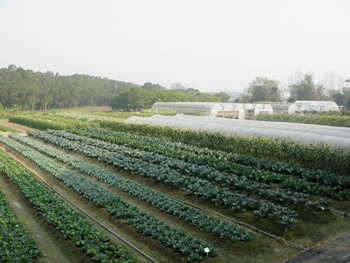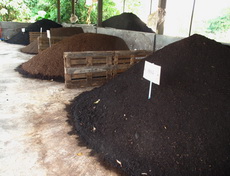
When conventional farmers switch to organic farming, they often face a lot of technical problems such as soil fertility management, pest and disease control etc. In order to assist organic farmers to overcome these problems, field trials are set up in the Tai Lung Experimental Station for demonstration and seminars are also regularly conducted. Since the first in-conversion organic field set up in April 2000, organic farming area in Tai Lung Experimental Station is about 69 dc (4.7 ha).
Regarding organic pest control techniques, we have also set up many experimental trials in Tai Lung Experimental Station and test for the efficacies of various organic pesticides such as neem oil and matrine for organic farmers use. In 2003, we have also invented a "Bug Sucking Machine" to control the flea beetle problems in Brassica vegetables. To solve the melon fruit fly problem faced by organic farmers, we have managed to design an integrated melon-fly control method which is very effective and economical.
In Tai Lung Experimental Station, we have also carried out field trials for specialty crops and then introduced to our organic farmers. For example, cherry tomato, white bitter gourd, cucumber, sweet pepper, strawberry, watermelon and rock melon are some of the newly introduced specialty crops for local organic farmers.

Soil is considered to be the origin of everything and its fertility is vital to every aspect of crop production. In organic farming, the use of compost plays a very important role to sustain the soil fertility for crop production. In Tai Lung Experimental Station, we have set up composting facilities to recycle crop residues, tree branches and other biodegradable materials produced on the farm and demonstrate to organic farmers how they can do it on their own farms.
|